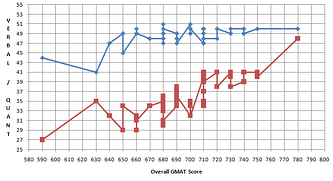
While I’d describe myself as above average at math, when I was preparing for the GMAT, I realized two things:
- I hadn’t taken a pure “math class” in a long time and...
- I’ve never been good at mental math.
Context: My Math Background and GMAT Quant Score
First, a little context on my background – which I think many GMAT test takers might relate to.
In high school, I was in the advanced math classes, including Calculus. I took the ACT a few times, and if I can remember that far back, my ACT-Math score was above the 90th percentile every time – sometimes much higher. In college, I majored in Finance, which required a lot of math. After college, I became a business strategy consultant, and built lots of extremely advanced financial valuation models, and gained tons of valuable experience debating arcane and complex valuation principles – which again, involve a lot of math.
All in all, if you’d asked me whether I was “good at math” I would have said yes.
But, I hadn’t really taken a pure math class in over 6 years. Also, for whatever reason, doing relatively simple math quickly in front of colleagues, or even figuring out a tip at a restaurant in front of friends, always made me nervous. I struggled with mental math.
And sure enough, my GMAT math score was lower than I was hoping for. I ended up scoring very well on verbal, but in only the 75th percentile on Quant. I ultimately was able to get into Kellogg, which is at least one data point that violates the 80/80 rule (i.e., a rule of thumb many people believe in, which suggests that top MBA programs want to see both Quant and Verbal scores above the 80th percentile).
So, based on this experience, this post offers a two part strategy for improving your GMAT quant score:



 Culture is an important concept when considering business school. This is true in a variety of ways.
Culture is an important concept when considering business school. This is true in a variety of ways.
 One of the more difficult GMAT problem types deals with summing an arithmetic sequence. Problem 157 in the 12th edition Official Guide is an example:
One of the more difficult GMAT problem types deals with summing an arithmetic sequence. Problem 157 in the 12th edition Official Guide is an example: You’ve just finished taking the GMAT, and you’re happy with your score. There are more options for obtaining an MBA than you might think.
You’ve just finished taking the GMAT, and you’re happy with your score. There are more options for obtaining an MBA than you might think.
